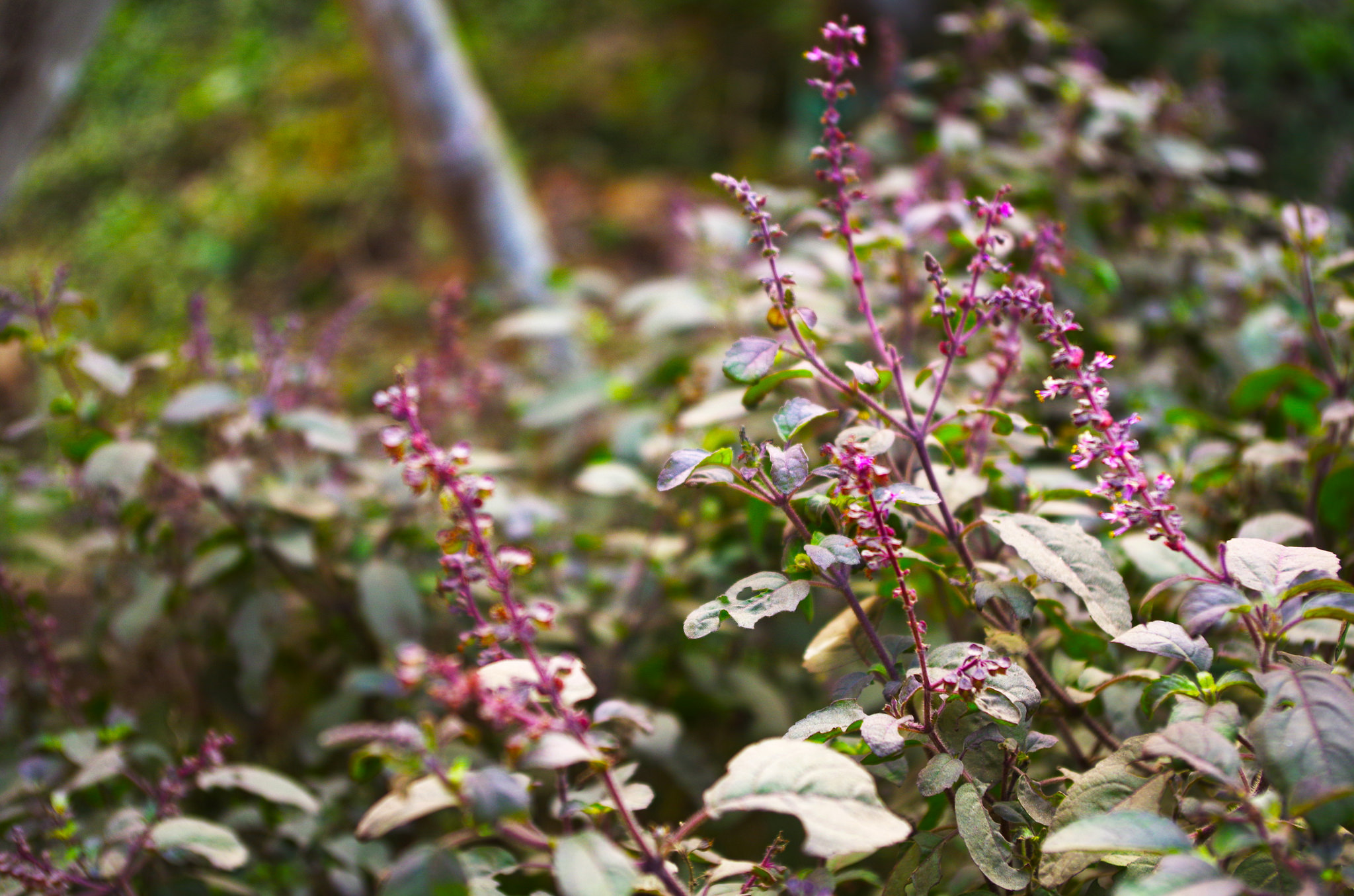Basil derives its name from the Greek word “Basileus” which means “king” emphasizing its fabulous rank among other plants in the ancient Mediterranean civilizations. It is really one of the royal essential oils to strengthen mind and heart and to reinforce resistance against infectious disease.
This plant, member of the mint family and originally native to India and other subtropical areas of Asia, grows as a low bush up to three feet in height with its tender light green and fragrant leaves and flowers of white or reddish color. Being cultivated as a perennial or annual plant since more than 5.000 years it thrives now all over the world, sheltered by the stable climate of warm regions for developing the brilliance of its sweet pungent flavor.
The complexity of Basil with its anis-like scent is expressed in a variety of at least twelve different types of plants being cultivated on various soils and in landscapes favorable to their growth and answering special traditional culinary and medicinal demands. The most commonly grown variety is sweet Basil. Other well known types are cinnamon Basil, thai Basil, lemon Basil, holy Basil (Tulsi) and red rubin Basil.
Essential Oil
Basil’s essential oil is obtained through steam distillation of the full-grown blooming herbs. It has a slightly yellowish colour. The chemical ingredients include a-pinene, camphene, b-pinene, myrcene, limonene, cis-ocimene, camphor, linanool, methyl chavicol, y-terpineol, citronellol, geraniol, methyl cinnamate and eugenol, depending on the chemotype of the plant with its different varieties.
Even though Basil is commonly associated with recipes of the Italian and Mediterranean kitchen, especially because of its fresh and irresistible flavor, it is most importantly a powerful healing plant.
Traditional Healing
Tested and approved by age-long traditional use, the healing power of Basil accounts for a huge number of medicinal effects:
-
Its nature is purifying and energizing, helpful in cases of fever, cold, flu and pulmonary infections and to enhance the body resistance against different types of microbes like parasites and bacteria.
-
It is widely used in ointments for the treatment of skin disorders and may be added to liquid bath soaps and shampoos to stimulate hair growth.
-
It is an ally for digestion as it improves the absorbing quality of the bowels and assists in the treatment of ailments connected to gastric disorders, spasms of the stomach, flatulence and constipation, by promoting the secretion of certain digestive enzymes.
-
Its antispasmodic property shows positive effects on menstrual cramps and on heart diseases.
-
It is also used as insect repellent to protect the body against bites.
-
Routine screening tests are taken for the proof of the detoxifying, blood-purifying, hypoglycemic, galactogenic and even anti-cancer qualities of Basil.
-
By means of its invigorating and stress-relaxing properties it strengthens the nervous system and is a good choice in case of mental stress and problems of anxieties. It is also known to help as an uplifting energizer against nervous headaches, migraines, memory loss, insomnia and depression.
Ancient Roots
At a more spiritual level, Basil is particularly linked to devotion and protection of the Divine. According to Ayurveda, it strengthens the connection between the heart and the mind. It is devoted to Krishna, the god of love and compassion.

Basil’s neuro-regulating and invigorating energy make it a choice oil for improving the mind-body connection, uplifting the spirit and promoting intuition.
The “Incomparable One” or “Queen of Herbs” as Tulsi is called emphasizes its enormous functional role not only for the ceremonial realm of offerings but also within the common daily life of traditional India. Radiating Krishna’s blessings and due to its peculiar biological compounds, Basil has ever been worshiped in India and planted in the courtyards and domestic areas owing to its different properties of warding off not only misfortune but also diseases caused by attacks of any sort of insects.
In Ayurveda
Concerning the Ayurvedic healing tradition of India, Holy Basil, as a good medicinal assistant, alleviates special ailments caused by the disorder of the “Vata” and “Kapha” doshas prevailing in the nervous as well as in the pulmonary and digestive system. Thus by reducing special over-activities of our psychosomatic disposition, it can help to restore balance among the dynamics of different levels of our human nature.
With so many benefits on so many levels, its revered tradition and its calming ways, one can only say that Basil stands as “A warrior king with the gait of peace.”
Testimonial with Holy Basil and other essential oils
“Our farmer friend Guy who often helps distilling with us at our Aromatherapy Center in High Provence / France when we receive groups was not answering the phone for some time – finally we got him and were shocked to hear his very weak voice, very unfamiliar for him. He told us he was in bed since days with a severe gastro-enteritis, also strong diarrhea as a symptom. He did not eat any more……We grabbed 5-6 essential oils from our lab and straight made with the car the 1 hour drive to his home.
He was really not in good shape – had never seen him like this. At his age 77 he looked nearer to death than to life. I asked him for some small jar of honey and mixed into it essential oils of Thyme thymol type, Mountain Savory, Cinnamon bark, Holy Basil, Tarragon, Fennel – something like 3 % of essential oils in the blend with honey. Then told him to put his finger tip into it every hour and lick it……..
Next morning he called us, his voice much better and he said : “first thing I did today I went to fridge and prepared my breakfast, I was hungry again.” After a few days he had completely recovered.”
Malte Hozzel – Summer 2015
* to find Oshadhi near you please visit www.oshadhi.com